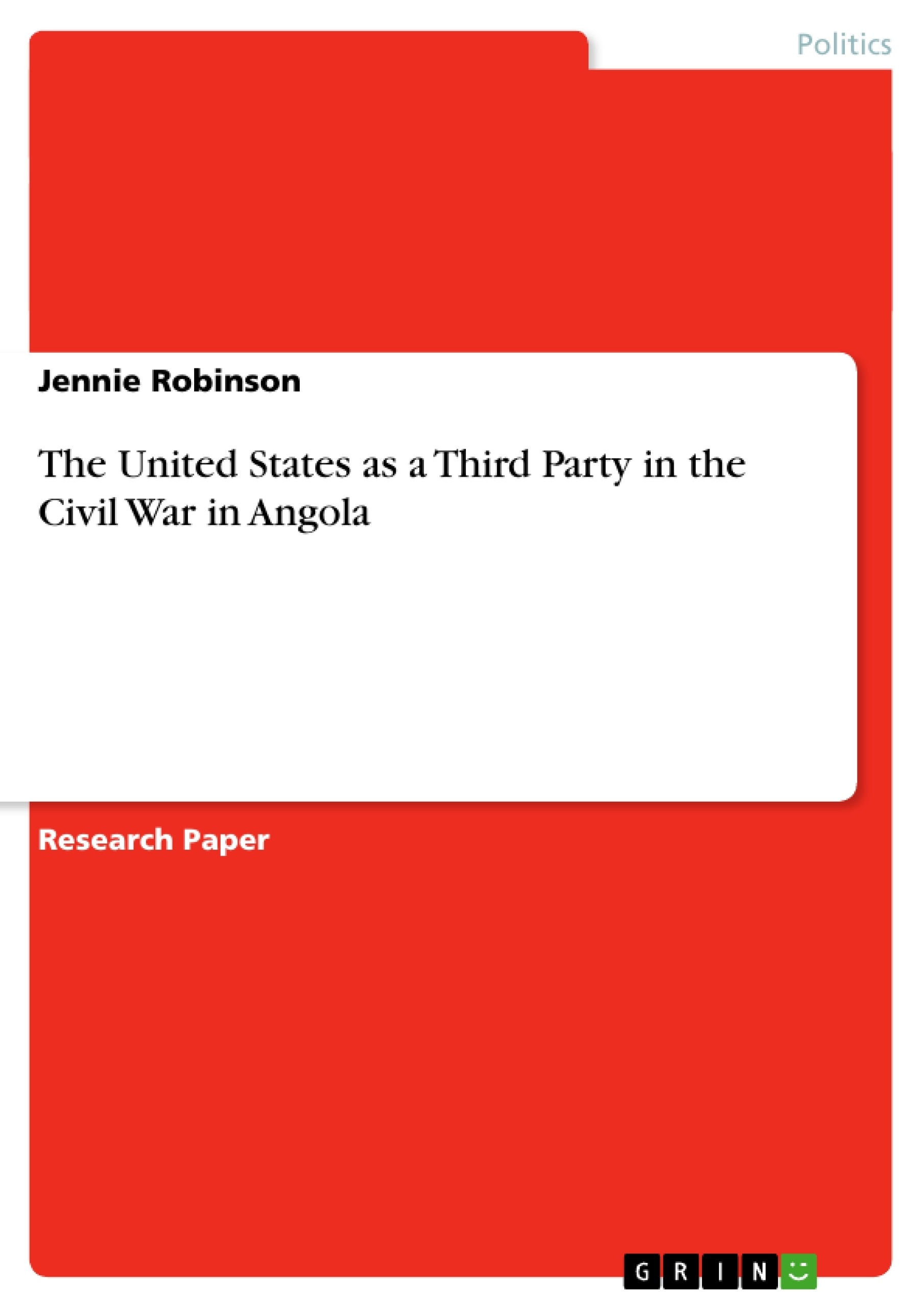Angolan nationalist movements’ struggle for independence (gained in 1975) against the Portuguese colonial power was to transform into an intrastate conflict between the parties: MPLA, backed by Cuba, and the FNLA plus Unita, backed by South Africa and the United States (US); and into an interstate conflict entangled within the Cold War scenario, so as to involve outsiders such as the Soviet Union, the US, Cuba and South Africa, each seeking to “shape an outcome that would advance its perceived interests”.1
This paper will attempt to address the question of how third party intervention, in this case the US renders resolution of the conflict more difficult because of its primary concern being its own narrow self-interest.
1 D. Rothchild, Conflict management in Angola
Inhaltsverzeichnis (Table of Contents)
- Introduction
- Development
- A. The role of a third party
- B. Civil war in Angola
- C. The US as an interested third party
- D. Conflict resolution
- D.1. A Transcend perspective
- Conclusion
- Annex
- References
Zielsetzung und Themenschwerpunkte (Objectives and Key Themes)
This paper examines how third-party intervention, specifically the US, in the Angolan Civil War, complicated the conflict resolution process due to the pursuit of self-interest. The paper aims to analyze the role of third parties in conflict resolution and explore how their narrow self-interest can hinder peaceful outcomes.- The Role of Third Parties in Conflict Resolution
- The Angolan Civil War as a Case Study
- The United States' Involvement and Self-Interest
- The Impact of Third-Party Intervention on Conflict Resolution
- The Transcend Perspective of Conflict Resolution
Zusammenfassung der Kapitel (Chapter Summaries)
The introduction sets the scene, outlining the Angolan Civil War as an intrastate conflict entangled in Cold War dynamics, with the US, Soviet Union, Cuba, and South Africa vying for their own interests. It frames the paper's focus on analyzing the US' role in hindering conflict resolution due to its self-interest. The development section explores the role of third parties in conflict resolution, citing Bercovitch and Houston's emphasis on mediation's historical significance across cultures. It discusses the complexities of the international arena and how third-party interventions can alter power dynamics and communication patterns. The chapter then dives into the Angolan Civil War, delving into its historical context, including the origins of the conflict, the involvement of various international actors, and the emergence of a “war economy”. It analyzes the intricate power dynamics and the influence of external actors, including the US, on the conflict's trajectory. The chapter then explores the US' involvement in the Angolan Civil War, highlighting their support for UNITA and their perceived self-interest in shaping a government amenable to Western influence. It further examines the broader implications of contemporary internal wars, drawing attention to the emergence of parallel economies and warlordism, which complicate traditional conflict resolution models.Schlüsselwörter (Keywords)
This paper focuses on the Angolan Civil War, third-party intervention, conflict resolution, self-interest, the United States, international relations, Cold War, war economy, warlordism, and the Transcend perspective.Frequently Asked Questions
What was the primary cause of the Angolan Civil War according to the paper?
The war originated as a struggle for independence from Portugal, which transformed into an internal conflict between MPLA, FNLA, and UNITA, further complicated by Cold War foreign interventions.
How did the United States intervene in the conflict?
The US supported the FNLA and later UNITA, primarily to counter Soviet and Cuban influence and to establish a government amenable to Western interests.
Why did third-party intervention make resolution more difficult?
Interventions by powers like the US and Soviet Union were often driven by narrow self-interests rather than peace, which altered power dynamics and sustained the "war economy."
What is the "Transcend perspective" mentioned in the paper?
It is a conflict resolution model that looks beyond traditional mediation to address deep-seated issues and the complex role of external actors in modern internal wars.
Which other countries were major outsiders in the Angolan conflict?
Besides the United States, the Soviet Union, Cuba, and South Africa were the key external players seeking to shape the outcome for their own strategic gains.
- Arbeit zitieren
- Jennie Robinson (Autor:in), 2006, The United States as a Third Party in the Civil War in Angola, München, GRIN Verlag, https://www.grin.com/document/135437



